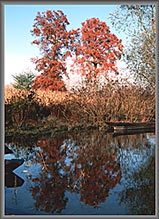Over the last two centuries, the pressures of human settlements have led on the one hand to the biotic communities of the Tuscan wetlands losing several autochthonous species.
On the other, in compensation, they have gained a remarkable contingent of exotic species, introduced for different reasons.
However, it would be misleading to take this simply as a "substitution". In most cases, the new guests share a high adaptive capacity and are highly competitive for resources, often to the point of becoming another threat to the indigenous species.
The naturalisation of many introduced animals, with all the ecological implications they bring, is a problem deserving particular attention.
Each case must be evaluated individually, considering its effects on the pre-existing equilibrium and taking the necessary managerial measures.
Difficulties in research and intervention, together with high costs, call for particular efforts to prevent this phenomenon.




